Notes
- ↑ John Bellenden Ker (1840). Essay on the Archaeology of Our Popular Phrases: Terms and Nursery Rhymes. John King. pp. 191–.
- ↑ Richard Scarry, Richard Scarry's Best Mother Goose Ever (Western Publishing Company Inc., 1970), pp. 10-11.
"The Cat Sat Asleep by the Side of the Fire" is an English nursery rhyme. [1]
One of the most commonly used modern versions of the rhyme is:

A nursery rhyme is a traditional poem or song for children in Britain and other European countries, but usage of the term dates only from the late 18th/early 19th century. The term Mother Goose rhymes is interchangeable with nursery rhymes.

Humpty Dumpty is a character in an English nursery rhyme, probably originally a riddle and one of the best known in the English-speaking world. He is typically portrayed as an anthropomorphic egg, though he is not explicitly described as such. The first recorded versions of the rhyme date from late eighteenth-century England and the tune from 1870 in James William Elliott's National Nursery Rhymes and Nursery Songs. Its origins are obscure, and several theories have been advanced to suggest original meanings.

Richard McClure Scarry was an American children's author and illustrator who published over 300 books with total sales of over 100 million worldwide. He is best known for his Best Ever book series that take place primarily in the fictional town of Busytown, "which is populated by friendly and helpful resident [animals...such as] Mr. Frumble, Huckle Cat, Mr. Fixit, Lowly Worm, and others..." The series spawned a media franchise.

"Little Bo-Peep" or "Little Bo-Peep has lost her sheep" is a popular English language nursery rhyme. It has a Roud Folk Song Index number of 6487.
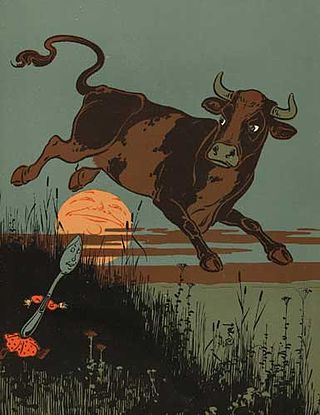
"Hey Diddle Diddle" is an English nursery rhyme. It has a Roud Folk Song Index number of 19478.
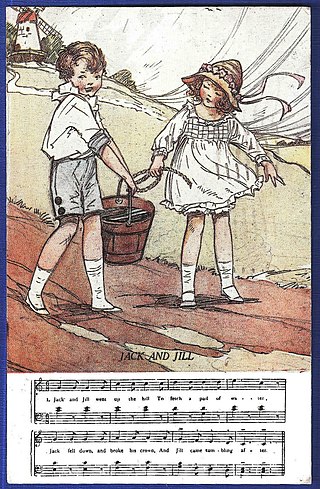
"Jack and Jill" is a traditional English nursery rhyme. The Roud Folk Song Index classifies the commonest tune and its variations as number 10266, although it has been set to several others. The original rhyme dates back to the 18th century and different numbers of verses were later added, each with variations in the wording. Throughout the 19th century new versions of the story were written featuring different incidents. A number of theories continue to be advanced to explain the rhyme's historical origin.
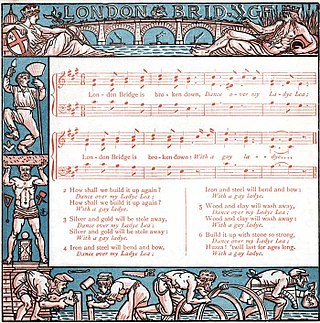
"London Bridge Is Falling Down" is a traditional English nursery rhyme and singing game, which is found in different versions all over the world. It deals with the dilapidation of London Bridge and attempts, realistic or fanciful, to repair it. It may date back to bridge-related rhymes and games of the Late Middle Ages, but the earliest records of the rhyme in English are from the 17th century. The lyrics were first printed in close to their modern form in the mid-18th century and became popular, particularly in Britain and the United States, during the 19th century.
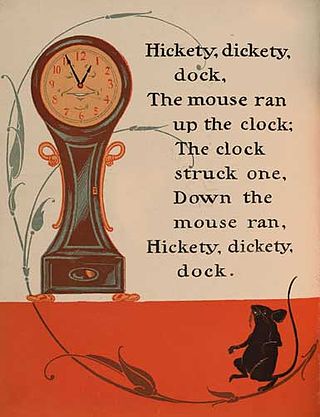
"Hickory Dickory Dock" or "Hickety Dickety Dock" is a popular English-language nursery rhyme. The Roud Folk Song Index number is "6489".

"The Man in the Moon Stayed Up Too Late" is J. R. R. Tolkien's imagined original song behind the nursery rhyme "Hey Diddle Diddle ", invented by back-formation. It was first published in Yorkshire Poetry magazine in 1923, and was reused in extended form in the 1954–55 The Lord of the Rings as a song sung by Frodo Baggins in the Prancing Pony inn. The extended version was republished in the 1962 collection The Adventures of Tom Bombadil.

"Little Miss Muffet" is an English nursery rhyme of uncertain origin, first recorded in 1805. It has a Roud Folk Song Index number of 20605. The rhyme has for over a century attracted discussion as to the proper meaning of the word tuffet.

"Old Mother Hubbard" is an English-language nursery rhyme, first given an extended printing in 1805, although the exact origin of the rhyme is disputed. It has a Roud Folk Song Index number of 19334. After a notable nursery success, it was eventually adapted to a large variety of practical and entertaining uses.

"Little Jack Horner" is a popular English nursery rhyme with the Roud Folk Song Index number 13027. First mentioned in the 18th century, it was early associated with acts of opportunism, particularly in politics. Moralists also rewrote and expanded the poem so as to counter its celebration of greediness. The name of Jack Horner also came to be applied to a completely different and older poem on a folkloric theme; and in the 19th century, it was claimed that the rhyme was originally composed in satirical reference to the dishonest actions of Thomas Horner in the Tudor period.
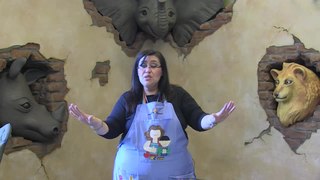
"The Itsy Bitsy Spider" is a popular nursery rhyme, folksong, and fingerplay that describes the adventures of a spider as it ascends, descends, and re-ascends the downspout or "waterspout" of a gutter system or open-air reservoir. It is usually accompanied by a sequence of gestures that mimic the words of the song. Its Roud Folk Song Index number is 11586.
Busytown is a fictional town depicted in several books by American children's author Richard Scarry. Busytown is inhabited by an assortment of anthropomorphic animals, including Huckle Cat, Lowly Worm, Mr. Frumble, police Sergeant Murphy, Mr. Fixit, Bananas Gorilla and Hilda Hippo.

Drummer Hoff is an illustrated children's book by Barbara and Ed Emberley. Ed Emberley won the 1968 Caldecott Medal for the book's illustrations. Written by Barbara Emberley, it tells a cumulative tale of seven soldiers who build a cannon named "Sultan", and Drummer Hoff, who fires it off, with the book exploding into a blast of colors. The last picture shows the exploded cannon at a future point in time among wildflowers and birds. The illustrations, done in woodcuts, evoke both 1960s psychedelica and Colonial American engravings. In 1969, the book was adapted into an animated 6 minute theatrical short, directed by Gene Deitch and produced by Morton Schindel of Weston Woods Studios. It was released on DVD in 2008.

The Busy World of Richard Scarry is an animated children's television series, produced by CINAR Animation and France Animation in association with Paramount Television, which aired from 1994 to 1996, first on Showtime, later on Nickelodeon, and ran for 65 episodes. The television series was based on the books drawn and written by Richard Scarry.

"Round and round the garden" is an English language nursery rhyme typically accompanied by fingerplay. It has a Roud Folk Song Index number of 19235.

‘Little Robin Redbreast’ is an English language nursery rhyme, chiefly notable as evidence of the way traditional rhymes are changed and edited. It has a Roud Folk Song Index number of 20612.
"When I Was a Bachelor" is an English nursery rhyme.
Nicola Mary Bayley is a Singaporean-born British children's book illustrator and author. She is most known for her illustrations of cats, including in the books The Tyger Voyage by Richard Adams, The Mousehole Cat by Antonia Barber, Katje, The Windmill Cat by Gretchen Woelfle and others.